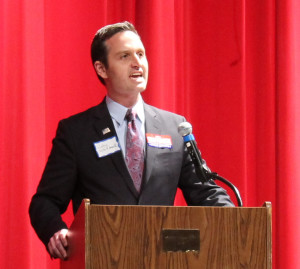I was reading the other day about the massive dividends currently being paid by the companies in the S&P 500. Dividends, of course, are payments – generally out of profits – made by companies to their shareholders. When a company has “extra” cash (a.k.a profit) it has three choices as to what it can do with it. It can reinvest it in the company (e.g., giving employees raises, opening new offices or facilities, expanding product lines, etc). It can hold and “save” that capital in financial instruments, or it can payout that extra cash to its owners (shareholders) as dividends.
In 2013, the companies of the S&P 500 chose the third option, a lot. To the tune of almost $340,000,000,000 in dividend payments to shareholders. Most shareholders are institutions (e.g., pension funds) or individuals, more often than not the wealthiest individuals.
We know that this has been an infamous “jobless recovery,” as evidenced by the major push to extend emergency unemployment insurance by Democrats and the President (along with some right-minded Republicans). We also know that a major driver of job growth is consumer spending. So while I was reading this article about how corporate dividends in 2014 were projected to be a record breaking $352,000,000,000, I found myself engaging in a thought experiment:
What if, instead of paying dividends, all those corporations gave every employed American a bonus instead? What would that look like? I wanted to do this thought experiment because I remembered how our elected officials were so bullish on the the idea that giving everybody a tax rebate check would help our economy in 2008 (when Geo. W. Bush was still president, not incidentally).
According to the BLS, the civilian employed labor force was 155,294,000 in December 2013. That’s just people with jobs. It doesn’t include the unemployed, the incarcerated, or those in the military.
Given that, it is a simple matter to determine how much of a bonus S&P Corporations could afford to pay every working American. We just divide the number of employed people in America into the value of the dividends paid by the S&P Corporations. (Remember, this money is from dividends, so comes from profits, not revenues. That is, it is “extra” cash these companies have on hand after paying for all operations and interest etc.)
“You have a job, here’s a bonus” bonus = $2,185
Interesting, huh? I would certainly appreciate a $2,000 check from the companies I’ve done my part supporting by participating in this economy.
Put another way, it would take someone working for the minimum wage seven and a half weeks to earn the amount that the nation’s biggest corporations could afford to give them as a bonus, without impacting operations at all.
Of course companies need to pay dividends. And dividends are critical to the long-term stability of the de facto U.S. retirement system, which is based on institutional investment in corporate stocks and bonds. But it seems to me that corporations could afford to reinvest some of that capital in their workforce, in the form of raises. If instead of paying record-breaking dividends, they just paid staggering dividends, they could afford to give all their U.S. employees not insignificant raises, which would have a pretty big impact on boosting our economy.
Just a thought experiment for a Tuesday afternoon.



